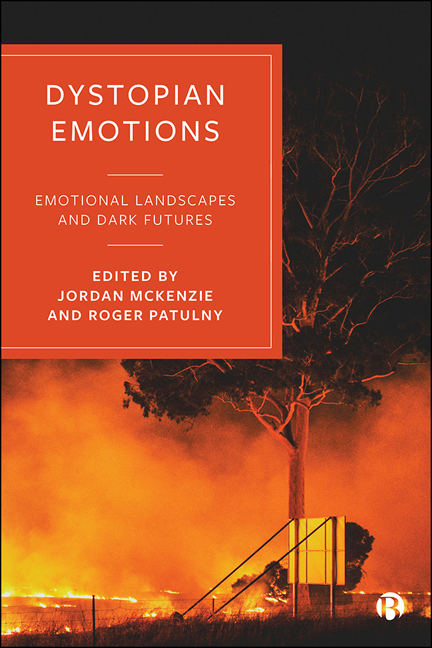Book contents
- Frontmatter
- Contents
- Notes on Contributors
- Acknowledgements
- Introduction: The Feeling of Dystopia
- 1 Borderland Emotions: A Case Study of Youths in Kinmen, Taiwan
- 2 Beyond Wicked Facebook: A Vital Materialism Perspective
- 3 Detangling Online Dystopias: Emotional Reflexivity and Cyber-Deviance
- 4 Mass Emotional Events: Rethinking Emotional Contagions after COVID-19
- 5 Between the Nationalists and the Fundamentalists, Still We Have Hope!
- 6 ‘The New Economy and the Privilege of Feeling’: Towards a Theory of Emotional Structuration
- 7 Neo-Villeiny University
- 8 Resuscitating the Past: Zygmunt Bauman’s Critical Analysis of the Recent Rise of Retrotopia
- 9 Hope Out of Stock: Critical and Melancholic Hope in Climate Fiction
- Conclusion: A Critical Mass of Emotions – Reflexivity, Loneliness and Hope?
- Index
3 - Detangling Online Dystopias: Emotional Reflexivity and Cyber-Deviance
Published online by Cambridge University Press: 13 May 2022
- Frontmatter
- Contents
- Notes on Contributors
- Acknowledgements
- Introduction: The Feeling of Dystopia
- 1 Borderland Emotions: A Case Study of Youths in Kinmen, Taiwan
- 2 Beyond Wicked Facebook: A Vital Materialism Perspective
- 3 Detangling Online Dystopias: Emotional Reflexivity and Cyber-Deviance
- 4 Mass Emotional Events: Rethinking Emotional Contagions after COVID-19
- 5 Between the Nationalists and the Fundamentalists, Still We Have Hope!
- 6 ‘The New Economy and the Privilege of Feeling’: Towards a Theory of Emotional Structuration
- 7 Neo-Villeiny University
- 8 Resuscitating the Past: Zygmunt Bauman’s Critical Analysis of the Recent Rise of Retrotopia
- 9 Hope Out of Stock: Critical and Melancholic Hope in Climate Fiction
- Conclusion: A Critical Mass of Emotions – Reflexivity, Loneliness and Hope?
- Index
Summary
Introduction
As the internet and online social media platforms (such as Twitter, Facebook, YouTube and other blog websites) become increasingly pervasive in the everyday lives of their users, instances of poor online behaviour and ‘cyber-deviance’ have become commonplace. There has been a proliferation of any number of activities that might be described as deviant, and not all of them fit a dystopian portrayal of the unregulated internet as a ‘a community plagued by internet trolls’ (Heart and Klink, 2017, p. 97) where ‘civil discourse may become a thing of the past’ (Kruse et al, 2018, p. 79). For example, deviant online behaviour is frequently examined as ‘online harassment’ (when perceived as unwanted or targeted) or ‘trolling’ (when referring to other forms of conflict in online spaces), but may also include acts of online activism (different, but related, to hacktivism) oriented to uncovering or responding to social injustices or even the spread of misinformation.
To avoid sinking into dystopian depictions of all online deviant behaviour as negative, it is important to engage and develop the literature around cyber-deviance in a manner that identifies netizens as passionate and reflective agents, and not just a ‘jeering pack’ (Binns, 2012, p. 551). However, this is no easy task. Theories surrounding appropriate methods for communication between individuals and groups within these online spaces continue to evolve, particularly regarding conflict within public debates (Chen and Lu, 2017), and tend to fragment rather than unify our conceptions of cyber-deviance. This can be seen in how the literature branches into three broad styles of socially deviant behaviour online (which will be discussed further in this chapter) broadly identified as:
1. sneaky thrills and entertainment such as trolling;
2. harassment and cyber-bullying; and
3. antidisestablishmentarianism (that is, online propaganda and ‘fake news’ intended to maintain a ‘status quo’).
There is no universally accepted overarching term to cover all of these deviant forms of online phenomena, nor even the three styles identified. There are many ambiguous, overlapping or conflating terms, particularly regarding ‘trolling’. Importantly, it should be noted that the behaviours comprising each of these styles are not always discernible from one another (Fragoso, 2015, p. 43).
- Type
- Chapter
- Information
- Dystopian EmotionsEmotional Landscapes and Dark Futures, pp. 53 - 70Publisher: Bristol University PressPrint publication year: 2021



